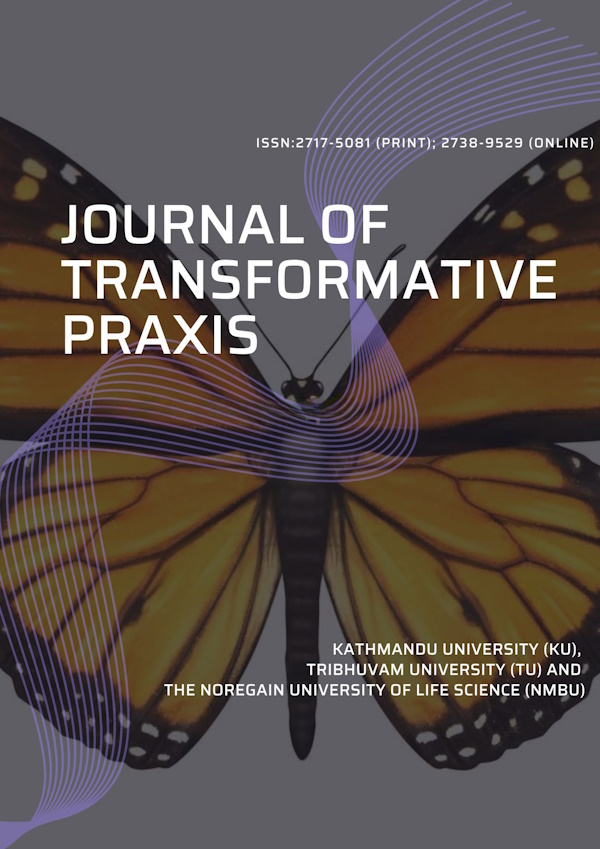
Journeying through Informing, Reforming and Transforming Teacher Education: Reflections on Curriculum Images
Original Article
Journal of Transformative Praxis, Volume 2, Issue 1, 2021, 8-18, https://doi.org/10.51474/jrtp.v2i1.520
Online publication date: Jun 30, 2021
Publication date: Dec 31, 2021
Views: 739 | Downloads: 372
How to cite this article
APA
In-text citation: (Qutoshi, 2021)
Reference: Qutoshi, S. B. (2021). Journeying through Informing, Reforming and Transforming Teacher Education: Reflections on Curriculum Images. Journal of Transformative Praxis, 2(1), 8-18. https://doi.org/10.51474/jrtp.v2i1.520
Reference: Qutoshi, S. B. (2021). Journeying through Informing, Reforming and Transforming Teacher Education: Reflections on Curriculum Images. Journal of Transformative Praxis, 2(1), 8-18. https://doi.org/10.51474/jrtp.v2i1.520
Vancouver
In-text citation: (1), (2), (3), etc.
Reference: Qutoshi SB. Journeying through Informing, Reforming and Transforming Teacher Education: Reflections on Curriculum Images. Journal of Transformative Praxis. 2021;2(1):8-18. https://doi.org/10.51474/jrtp.v2i1.520
Reference: Qutoshi SB. Journeying through Informing, Reforming and Transforming Teacher Education: Reflections on Curriculum Images. Journal of Transformative Praxis. 2021;2(1):8-18. https://doi.org/10.51474/jrtp.v2i1.520
AMA
In-text citation: (1), (2), (3), etc.
Reference: Qutoshi SB. Journeying through Informing, Reforming and Transforming Teacher Education: Reflections on Curriculum Images. Journal of Transformative Praxis. 2021;2(1), 8-18. https://doi.org/10.51474/jrtp.v2i1.520
Reference: Qutoshi SB. Journeying through Informing, Reforming and Transforming Teacher Education: Reflections on Curriculum Images. Journal of Transformative Praxis. 2021;2(1), 8-18. https://doi.org/10.51474/jrtp.v2i1.520
Chicago
In-text citation: (Qutoshi, 2021)
Reference: Qutoshi, Sadruddin Bahadur. "Journeying through Informing, Reforming and Transforming Teacher Education: Reflections on Curriculum Images". Journal of Transformative Praxis 2021 2 no. 1 (2021): 8-18. https://doi.org/10.51474/jrtp.v2i1.520
Reference: Qutoshi, Sadruddin Bahadur. "Journeying through Informing, Reforming and Transforming Teacher Education: Reflections on Curriculum Images". Journal of Transformative Praxis 2021 2 no. 1 (2021): 8-18. https://doi.org/10.51474/jrtp.v2i1.520
Harvard
In-text citation: (Qutoshi, 2021)
Reference: Qutoshi, S. B. (2021). Journeying through Informing, Reforming and Transforming Teacher Education: Reflections on Curriculum Images. Journal of Transformative Praxis, 2(1), pp. 8-18. https://doi.org/10.51474/jrtp.v2i1.520
Reference: Qutoshi, S. B. (2021). Journeying through Informing, Reforming and Transforming Teacher Education: Reflections on Curriculum Images. Journal of Transformative Praxis, 2(1), pp. 8-18. https://doi.org/10.51474/jrtp.v2i1.520
MLA
In-text citation: (Qutoshi, 2021)
Reference: Qutoshi, Sadruddin Bahadur "Journeying through Informing, Reforming and Transforming Teacher Education: Reflections on Curriculum Images". Journal of Transformative Praxis, vol. 2, no. 1, 2021, pp. 8-18. https://doi.org/10.51474/jrtp.v2i1.520
Reference: Qutoshi, Sadruddin Bahadur "Journeying through Informing, Reforming and Transforming Teacher Education: Reflections on Curriculum Images". Journal of Transformative Praxis, vol. 2, no. 1, 2021, pp. 8-18. https://doi.org/10.51474/jrtp.v2i1.520
ABSTRACT
This paper aims to address ‘how an auto/ethnographic muse explores informing, reforming and transforming states of teacher education and research practices.’ I critique informing and reforming states of teacher education in Pakistan for the limitations associated with these approaches rooted within the colonial system of education. Within these two approaches to education, I share the experiences of teaching, learning, research practices, and beliefs, which could not address a broader view of teacher education. To address the research problem, I applied an unconventional approach to research by using auto/ethnography as a methodological referent within a multi-paradigmatic research design space. In so doing, I used the paradigms of interpretivism, criticalism, postmodernism, and integralism as data referents, which enabled me to capture the lived experiences of my professional lifeworld at different stages. Moreover, I used critical reflections on the experiences as a teacher, teacher educator, and researcher as epistemic techniques to explore, explain and construct meaning out of the perceptions, beliefs, and practices. Perhaps, engaging autobiographically as an approach to knowing deep-seated views and practices and critically reflecting on the embodied values of practices open new ways of being and becoming a transformative learner(s). This paper invites readers to reflect critically on their own deep-seated practices by using such unconventional approaches to research that would enable them to experience a paradigm shift in their thinking, believing, viewing, and doing. I believe that in doing so, practitioners as researchers, with their own embodied values of practice in their professional lives, can transform self/others by creating their own living-educational-theories.
KEYWORDS
REFERENCES
---
LICENSE
This work is licensed under a Creative Commons Attribution-ShareAlike 4.0 International License.
